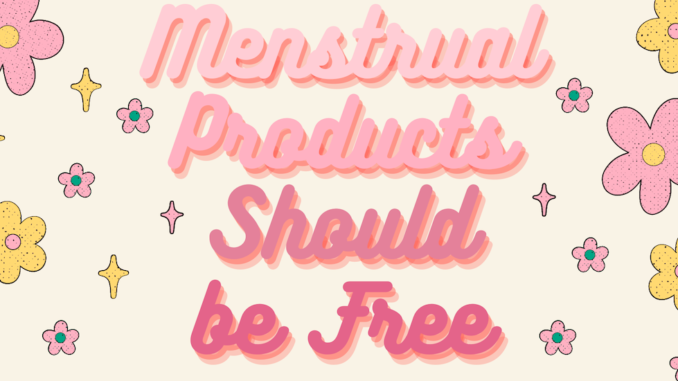
There is a menstrual movement happening at the high school. It started as a senior doing a year-long exit project and a sophomore creating a club to support women within the community and school. Together, they joined forces to spark a conversation about the lack of access to period products.
In the fall, the first step was getting approval from Principal Monica Asher.
“I was very excited to hear about this project and knew that I wanted to support these students in whatever way they needed to reach their goals. Once they are ready to present their idea to central office, I will set up the meeting and attend with them,” Asher said.
The next step was discovering schools that have already implemented this project. Through research, the students found that the Worthington School District partnered with Aunt Flow, a local business that provides high-quality and sustainable period products for schools and businesses and contacted the principals at Worthington Kilbourne and Thomas Worthington right away.
“Having products available significantly reduces anxiety. There will be some concern that students will take many products in the bathroom to avoid having to buy their own, but it’s truly a case by case situation and not the norm,” Thomas Worthington Principal Pete Scully said.
Through the string of emails, Scully directed students to Dr. Neil Gupta, the Director of Secondary Education at Worthington City Schools. He led the initiative for the district-wide effort to implement free period products.
“Across the nation and Central Ohio, we’re starting to see not only schools take on this project but also restaurants and other public spaces. We’re beginning to make period products more accessible. We have toilet paper, why would we not provide tampons and pads too?” Gupta said.
After gaining perspective from other schools and districts that have implemented free period products, the students decided that it was time to speak to a representative at Aunt Flow.
“What I do is I give students resources they need whether it be presentation templates, price estimates, statistics or even advocacy guides so they can make their argument to administrators as compelling as possible,” Aunt Flow Account Executive Genevieve Jaser said.
Jasper also recommended that the students create a petition to get support from students, staff and even alumni as well as collect personal experiences of how the lack of access to period products has affected them. So far, they have over 200 responses.
“I have had so many girls ask me for period products because they don’t have any. I have also been one of those people. It makes sense for girls to not worry about their period and having to frantically try to find period products,” sophomore Jayln Pelayo said.
Some people might find it hard to believe that there are students who attend the school who actually cannot afford period products. This is referred to as period poverty.
“Many girls cannot afford feminine products or have situations at home where they cannot access them, so it would be very helpful and convenient to have free feminine products at school for girls to use,” freshman Morgan Heilmann said.
Although there are some products available at the nurse, it’s inconvenient for students to have to go all the way there just to get what products they need. Additionally, there are dispensers in the women’s bathrooms. It costs 25 cents and is not accessible to students such as trans men who get their periods too.
“Not only women have periods, so going to the nurse can be harder for those students,” senior Levi Holmes said.
Orange alumni expressed how free period products would have been extremely helpful back when they were in grade school.
“I always tried to have my little ‘period bag’ for my friends, and it worked out until I ran out or had to shove a tampon in your sleeve and run to the bathroom. This would’ve made it a lot easier,” 2020 graduate Kira Pryor said.
Although the students working on this project have already accomplished a lot, they’re not quite done yet. Their last step is combining all the information and resources they have gathered and presenting it to central office to see if it is actually a possibility.


